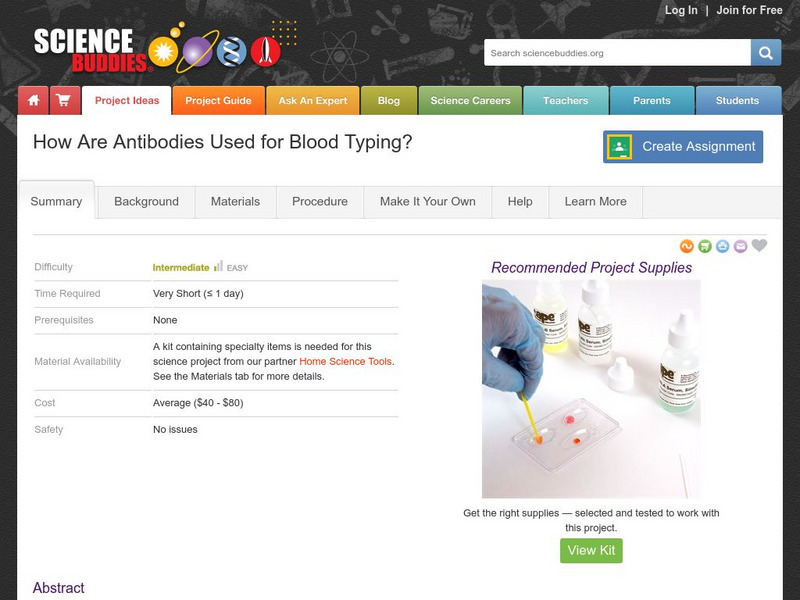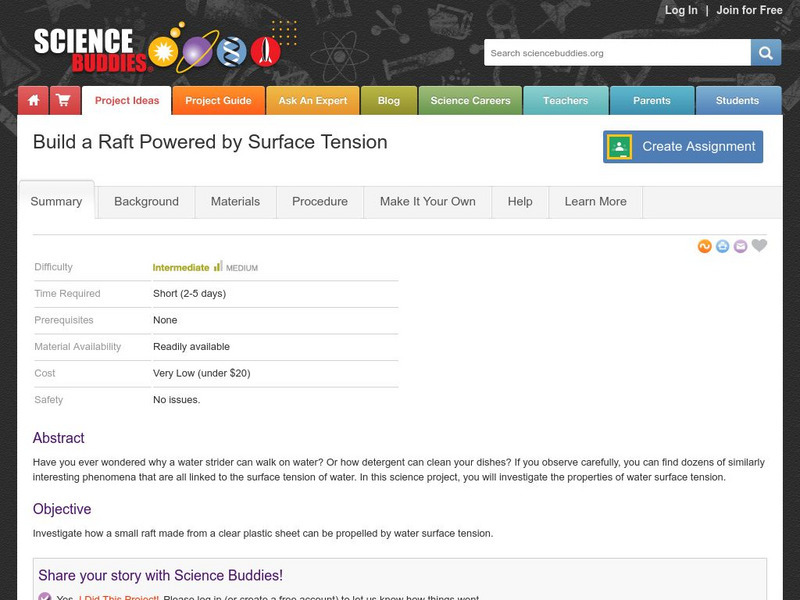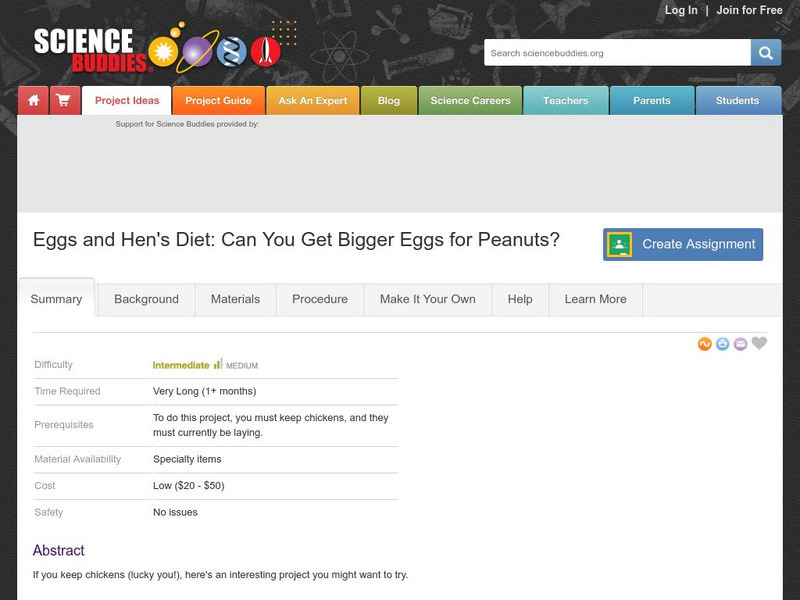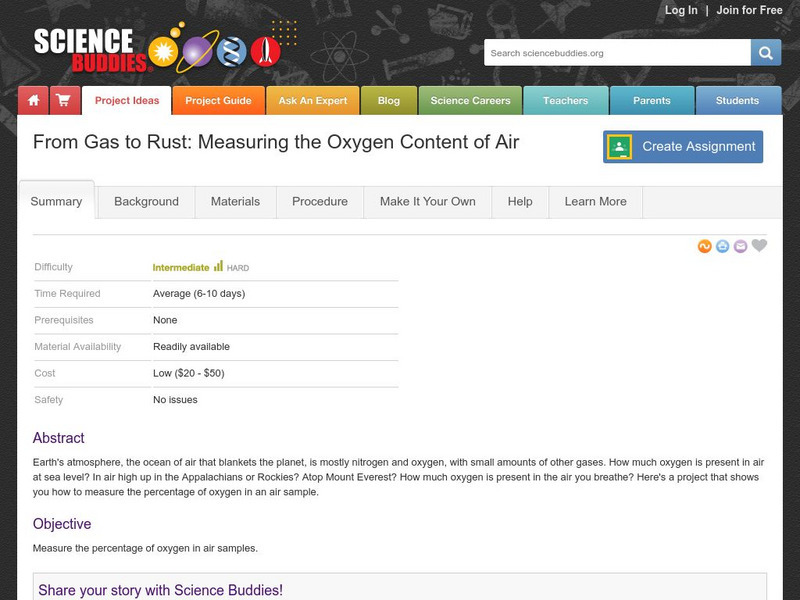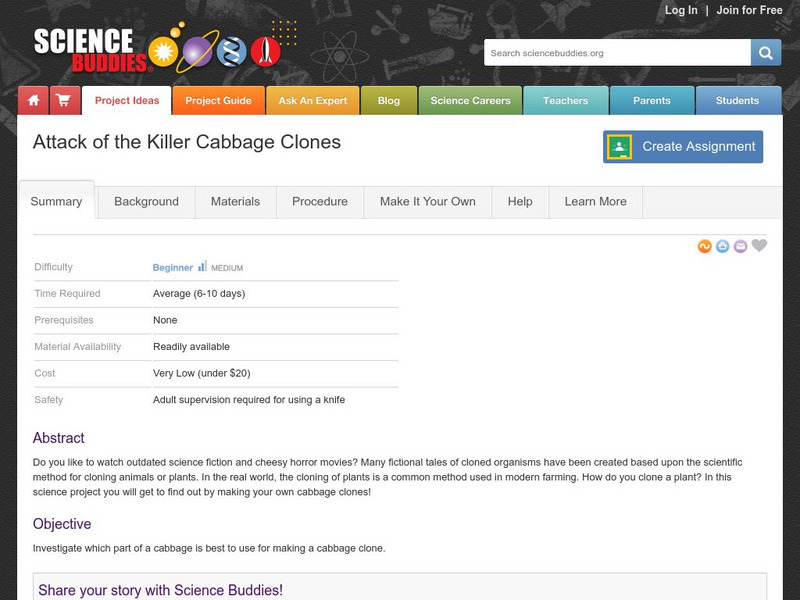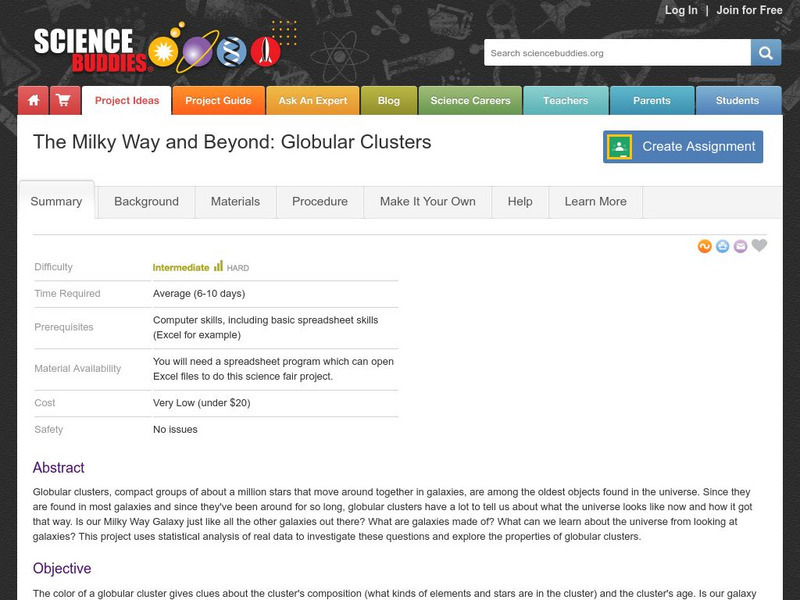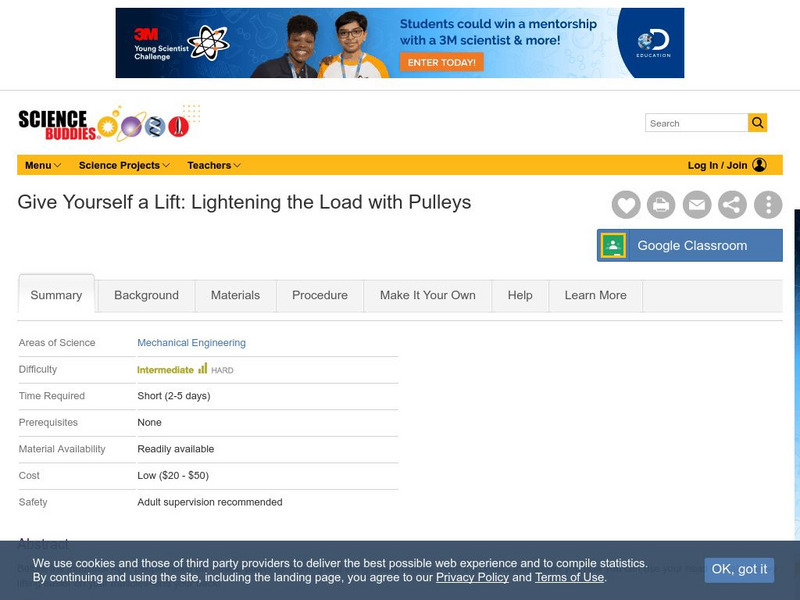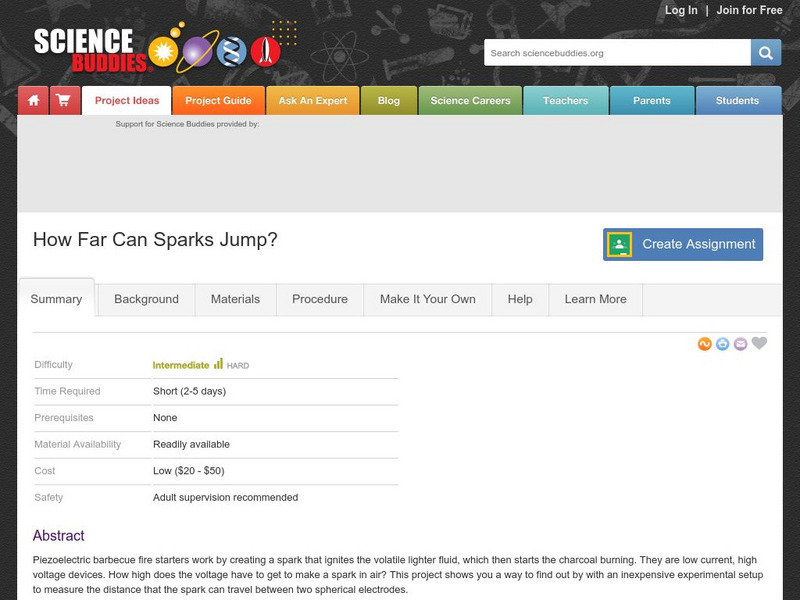Science Buddies
Science Buddies: Divide and Conquer: Proving Pick's Theorem for Lattice Polygons
If you like to play Tetris then you might like this project. You'll learn something interesting about the mathematics of complex shapes.
Science Buddies
Science Buddies: How Are Antibodies Used for Blood Typing?
The human immune system has various ways of responding to an infection caused by bacteria or viruses. Our bodies produce proteins (antibodies) that are highly specific for the infectious agent as a part of our "humoral" immune response....
Science Buddies
Science Buddies: Throwing You Some Curves: Is Red or Blue Longer?
This a straightforward, but interesting, project in geometry. It is a good first proof to try on your own. You should be able to figure it out by yourself, and you'll gain insight into a basic property of circles.
Science Buddies
Science Buddies: Build a Motorboat Powered by Surface Tension
If you look carefully, you could find dozens of similar interesting phenomena that are all linked to the surface tension of water. Here is a project that will help you understand and measure the properties of water surface tension.
Science Buddies
Science Buddies: Exploring Fractals
Although fractal images can be intriguingly complex, fractals are more than just pretty pictures. In this project, you'll explore the mathematical properties of the famous Mandelbrot and Julia sets. You'll learn about how these images...
Science Buddies
Science Buddies: Eggs and Hen's Diet: Can You Get Bigger Eggs for Peanuts?
The goal of this project is to determine whether feeding chickens a dietary supplement of peanuts will result in larger and heavier eggs. If peanuts do increase egg size, a secondary goal will be to determine the optimal amount of peanut...
Science Buddies
Science Buddies: Boyle's Law
This is a modern version of a classic experiment by Robert Boyle on the compressibility of gases. Boyle discovered the relationship between pressure and volume of gases that now bears his name. This project shows you a simple method for...
Science Buddies
Science Buddies: Charles's Law
This is a modern version of a classic experiment by Jacques Charles on the volume of a gas at different temperatures. Charles discovered the relationship between volume and temperature of gases that now bears his name. This project shows...
Science Buddies
Science Buddies: Solar Cell Power Output vs. Temperature
Solar cells provide a clean way of making electricity directly from sunlight. In this project you will build a simple circuit and experimental setup to investigate whether the power output of a solar cell changes with ambient temperature.
Science Buddies
Science Buddies: An Aerobic Exercise: Yeast Metabolism and Aeration
This is a straightforward project on glucose metabolism in yeast. You'll grow yeast under aerobic and anaerobic conditions and measure carbon dioxide output to assess metabolic efficiency.
Science Buddies
Science Buddies: What Is Home Sweet Home to a Bug?
If you had to choose between having your favorite dessert, going to a movie, or spending the night at a friend's house, which would you choose? This project shows you how you can "ask" a sowbug (or pill bug) a similar question in order...
Science Buddies
Science Buddies: From Gas to Rust: Measuring the Oxygen Content of Air
Earth's atmosphere, the ocean of air that blankets the planet, is mostly nitrogen and oxygen, with small amounts of other gases. How much oxygen is present in air at sea level? Is air high up in the Appalachians or Rockies? Atop Mount...
Science Buddies
Science Buddies: Attack of the Killer Cabbage Clones
Do you like to watch outdated science fiction and cheesy horror movies? Many fictional tales of cloned organisms have been created based upon the scientific method for cloning animals or plants. In the real world, the cloning of plants...
Science Buddies
Science Buddies: The Milky Way and Beyond: Globular Clusters
Globular clusters, compact groups of about a million stars that move around together in galaxies, are among the oldest objects found in the universe. Since they are found most galaxies and since they've been around for so long, globular...
Science Buddies
Science Buddies: Sunspot Cycles
Sunspot activity has been monitored continuously since about 1700. The historical data shows that sunspot activity rises and falls in a roughly 11-year cycle. This project shows you how you can use both graphical and statistical analysis...
Science Buddies
Science Buddies: An Experiment in Visual Perception
Graphical methods of data presentation are a key feature of scientific communication. This project will get you thinking about how to find the best way to communicate scientific information.
Science Buddies
Science Buddies: Give Yourself a Lift: Lightening the Load With Pulleys
Before the Industrial Age, people relied on muscle power for moving and lifting heavy objects. Here's a project that shows you how you can use your head to make heavy lifting easier on your muscles - and your back.
Science Buddies
Science Buddies: How Far Can Sparks Jump?
Piezoelectric barbecue fire starters work by creating a spark that ignites the volatile lighter fluid, which then starts the charcoal burning. They are low current, high voltage devices. This project shows you a way to find out by with...
Science Buddies
Science Buddies: Dome Sweet Dome
Geodesic domes are made of interconnected triangles that approximate the shape of a sphere. This project shows you how to build a geodesic dome using rolled-up newspapers and tape and then test how much weight your dome can support.
Science Buddies
Science Buddies: Mixing Light to Make Colors
You know how to make new colors by mixing paint or crayons. For example, you get green by mixing yellow and blue, or orange by mixing red and yellow. With paint, blue, yellow, and red are primary colors, which you can use to make other...
Science Buddies
Science Buddies: Solid Ground? Measuring Soil Bearing Capacity
Foundations for many types of structures rest on soil. This project shows how you can investigate the bearing capacity of different types of soil.
Science Buddies
Science Buddies: How Do Fears Change With Age?
Although some of us may not like to admit it, everyone's afraid of something. Big dogs, thunderstorms, public speaking, heights: what are you most afraid of? Do you think grown-ups have the same fears as kids? The goal of this project is...
Science Buddies
Science Buddies: Enzyme Catalyzed Reactions What Affects Their Rates?
Enzymes speed up chemical reactions by factors of at least a million. This project investigates some of the factors that affect how fast enzymatic reactions occur.
Science Buddies
Science Buddies: Testing the Accuracy of Eyewitness Testimony
Think back to the last time you went to the grocery store. How well can you describe the person who was ahead of you in the check-out line? How many details do you remember about the person? Here is a project to investigate the accuracy...
Other popular searches
- Science Fair Projects Ideas
- Science Fair Projects Topics
- Motion Science Fair Projects
- Coke Science Fair Projects
- Food Science Fair Projects
- Sports Science Fair Projects
- Cool Science Fair Projects
- Csi Science Fair Projects
- Edible Science Fair Projects
- Casi Science Fair Projects



